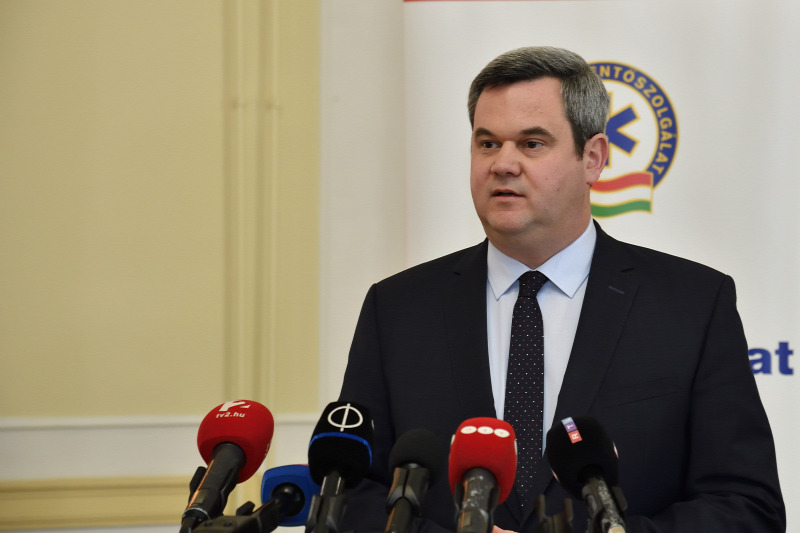The State Secretary responsible for health affairs of the Ministry of Health described as irresponsible and a threat to patient safety the proposal of the Hungarian Medical Chamber, which urges general practitioners not to sign the contract on the new on-call schedule. Péter Takács asked the chamber to "refrain from this irresponsibility and tendentious slips in the future".
Péter Takács stated at his press conference in Budapest on Sunday in response to the national delegate meeting of the Medical Chamber on Saturday:
this is irresponsible, which not only "stabs" family doctors, but also endangers patient safety.
He asked the chamber to "refrain from this irresponsibility and tendentious slips in the future."
The state secretary noted that the BM and the health government do not have a conflict with the medical community or health workers, but only with the medical chamber.
He noted: in the past period, despite "all efforts" of the government, no partnership was established with the IOC. He denied that the sector management does not coordinate with professional and interest protection organizations. They consulted with the IOC, trade unions, scientific societies and the Hungarian Academy of Sciences on several occasions - he listed, highlighting: "we strived for a continuous and lively dialogue".
Regarding the claim that the government does not coordinate with the IOC, Péter Takács said:
"if I want to put it delicately (.), then it's not elegant, if I want to put it more roughly, then it's pure bullshit".
They have repeatedly experienced, he added, that
it sounds different at the negotiating table than it does in public days later.
At the event, Péter Takács presented the email sent to him by the head of the MOK's family physician group, in which the chamber official classified the contract as acceptable "in its currently sent form", noting that the MOK can recommend its signature to colleagues.
"Three days later, there was a radical change in the IOC's communication"
- He told.
Responding to the IOC's proposals, the state secretary said that "there is no big difference of opinion between us at the level of principles". He responded to their suggestion that the healthcare system had collapsed: the Hungarian healthcare system continues to perform well, it performed well even during the waves of the coronavirus epidemic, the epidemic management can be said to be exemplary, and "we must continue to strengthen this organization".
"We don't say that everything is perfect (.), we know exactly where to reach into the system in order to make it better for the benefit of our patients"
- he stressed, emphasizing that the current transformation is not without foundation, the biggest patient safety risks were revealed in the emergency system.
He put it like this:
"a sane person cannot think that a ministry managing a sector is interested in making the work of those working in the sector impossible with its legislative amendment proposals".
The secretary of state called the "punitive attitude towards the interior" a "mantra without any basis". Referring to the "very significant" increase in doctors' wages, he noted:
show another government that "punishes the actors of the system by quadrupling their salaries in a short period of time".
According to his summation, HUF 1,470 billion more was spent on healthcare in 2022 than in 2010, of which HUF 350 billion "went" on medical wages alone.
Péter Takács also explained the specific wages and stated that
"the majority of doctors earn more per month than the minister in charge of the sector, let alone the state secretary".
He hinted that
they are also preparing for a "similar wage increase" for healthcare workers: within 14 months from now, the largest wage increase since the regime change will be implemented in two stages.
In closing his words, he called the attention of the doctors to "not get caught up in slogan-like points that have no basis and affect emotions, take the facts as a basis, and get information from them".
At the press conference, Gábor Csató, the director general of the National Ambulance Service (OMSZ), called the aim of the ambulance service, among others, to be "to be able to provide homogeneous, uniform, high-level care for everyone". "I can safely and confidently say that the emergency room operated by the OMSZ is still functional," stated the director general, who said that if the general practitioners do not sign the contract with the ambulance service, it will not be the OMSZ, but the patients who will suffer.
Background: The Hungarian Medical Chamber demands the development of a health strategy spanning government cycles
Péter Álmos announced that immediate, "fire-fighting" proposals were made at the delegates' meeting - for example, that healthcare professionals should receive a retroactive wage increase from January - and that they want to force a "system change" in the healthcare sector by developing a strategy that spans cycles.
For this purpose, pressure-exerting devices are also used: the representatives of the general practitioners decided to
deposit the termination of their duty performance contract and/or refrain from signing their new on-call contract, and the doctors working in specialized care decided to deposit the termination of their voluntary overtime contract
explained the vice president.
Péter Álmos emphasized that, in order to transform the healthcare sector, they insist that the government establish a working group with the involvement of professional chambers, the Hungarian Academy of Sciences (MTA), patient organizations and all parliamentary parties, which should start operating in the spring at the latest and have results by the end of the year of his work.
In his opinion
today, the healthcare system in Hungary no longer works, it has collapsed, patients do not receive care in time, the conditions for treatment in the system are not given, they are not adequate.
Gyula Kincses, the president of the IOC, also spoke about the fact that the Hungarian healthcare sector currently has no vision for the future, its performance, accessibility, and the quality of care have reached a critical point, which is why the delegates meeting was called.
I would like to achieve a better, fairer, more functional healthcare system in Hungary, in which both doctors and patients feel good, said the president of the chamber.
He also said that
the problems were reported to the government several times, and suggestions were made, but they were not listened to in any way.
He said that the terminations will be collected at the MOK's regional organizations, and the councils of these organizations will decide on the eventual escalation of the terminations.
According to the distributed press material, in addition to the wage increase for skilled workers, the MOK demands with immediate effect the strengthening of general medical and dental care by improving operating conditions and compensating for increased overhead costs, as well as improving the working conditions of workers in specialized care, for example by restoring the allowances taken away by specialist care workers and allowing for unlimited relocation by withdrawing legislation.
Source: Civilek.info / MTI
Front page photo: Péter Takács, the State Secretary responsible for health at the Ministry of the Interior, at the press conference held at the headquarters of the National Ambulance Service on February 5, 2023 / Photo: MTI / Péter Lakatos












